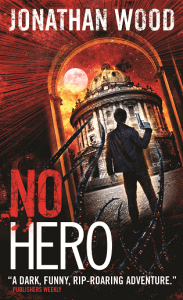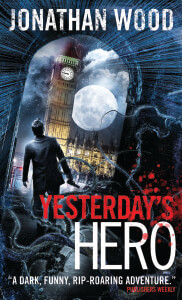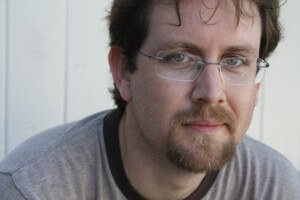Writers are notorious for giving advice on writing. Doesn’t take long on the Internet to find a million or so articles on how write better, faster and stronger prose. Because it’s inescapable, writers often are assaulted by opinions and ironclad rules on writing, which often contradict each other. In the end, you’re a bit confused and have no idea who to listen. I’ve talked about my disenchantment with writing advice as well.
What I’ve learned about the craft (writing is magic!) is that writing is one personal experience and no two writers are the same. Unless they’re clones. In which case I demand access to their cloning facility.
This is why I’ve taken to the streets to talk to writers about advice. What worked and what did not and why. The idea is not so much about to hash out new writing advice, but to foster more of a dialogue about a writer’s relationship with advice. This Monday I’ve invited author and dear friend Jonathan Wood to talk about writing (because that’s all writer ever talk about).
 Which is the one piece of go-to often-repeated writing advice that turned out to hinder your writing? And can you share an example of how/why it didn’t work in a particular project.
Which is the one piece of go-to often-repeated writing advice that turned out to hinder your writing? And can you share an example of how/why it didn’t work in a particular project.
To get to that answer, let me start by saying that the main lesson I learned from my first attempt to write a novel was that I didn’t know how to write a novel. Starting out, I could generally string an chapter together, but the wider scope of a novel escaped me. Having learned this lesson, I did what I usually do when I need advice: I turned to books. Mostly writing advice books. I learned about structure, self-editing, subplots, character arcs. And then I took everything, every rule I’d read, and I made sure I obeyed every single one as I wrote my second novel.
It is, pretty categorically, the worst thing I have ever written.
Yet despite the leaden prose and the formulaic plot, I also think of that books as the most important thing I’ve ever written. Because the thing about spending a year of your life slavishly following rules is that you learn them. And then with a little distance you can see exactly what you were trying to do at each point, and why it all went wrong.
There are very few pieces of writing advice, I think, that are wrong all the time. Conversely there are very few that are right all the time. It’s just a case of knowing the rules, and knowing the effect of following them and of breaking them. Sometimes you do actually want to pile on the adverbs. Sometimes passive voice is the perfect vehicle for showing a character’s distance from events. Everything has its time and place.
All that said – one piece of advice that was particularly disastrous to me was Orson Scott Card’s admonishment that all writers should write in completely transparent prose. In a craft essay up on his site he was very passionate on the point of transparent prose. He showed plenty of examples of why this style was the most commercially viable, and went on and on about how much more readers enjoyed it.
This is a fine case of advice that is a bad fit for the writer. For some people, transparent prose is perfect. For me, it’s a horror show. When I write, it’s a sort of performance. I need a voice to perform in. Removing that voice totally destroys my ability to do anything with language. Again, it’s not advice that’s wrong all the time. It’s just advice that’s wrong for me all the time. Identifying what advice works for you and what doesn’t is an important part of a writer’s growth.
What is the one thing you wish someone had told you about writing, which you had to learn the hard way on your own? Again a personal experience would be nice.
So, my debut novel is coming out for a second time, from a second publisher. My first publisher was Night Shade Books, which for some people will be enough information to paint the picture, but for others suffice it to say that they had significant cash flow problems, and we ended up parting ways.
Obviously the crash and burn of your writing career at someone else’s hands isn’t exactly something that people can warn you about. And, I’m honestly not sure what else could have been done. But I wish I’d been more receptive to the idea that writing is a long haul.
It took me nine years from writing my first novel to getting an agent. It took me two years and a new novel from that moment to getting published. Now it’s three years later and I’m repeating the process. But on the flip side, I’m still in my thirties. I’m really at the start of my career. There have been victories and defeats, but in the end there’s not one of them alone that will define where I am in ten years time. There’s always another chance to rise, to overcome. Things may go epically wrong, but then things can go very, very right. Things have gone that way for me. I’ve certainly been very lucky; having thought things were over, I’m now in a position where by the end of next year I’ll have four books in print. That’s pretty awesome.
Writing advice aside, what are you currently writing/about to publish/promoting?
So, as I just mentioned, by the end of 2015, I’ll have four books out. All four are in my Hero series. No Hero is out in March this year, with the sequel Yesterday’s Hero coming out in September. Then there are two more books out next year. Right now, I’m working through editorial changes on book 3 while writing book 4, and at the same time I’m promoting book 1. So I’m busy but it’s a very good sort of busy.
—

Jonathan Wood is an Englishman in New York. There’s a story in there involving falling in love and flunking out of med school, but in the end it all worked out all right, and, quite frankly, the medical community is far better off without him, so we won’t go into it here. His debut novel, No Hero was described by Publisher’s Weekly as “a funny, dark, rip-roaring adventure with a lot of heart, highly recommended for urban fantasy and light science fiction readers alike.” Barnesandnoble.com listed it has one of the 20 best paranormal fantasies of the past decade, and Charlaine Harris, author of the Sookie Stackhouse novels described it as, “so funny I laughed out loud.” His short fiction has appeared in Weird Tales, Chizine, and Beneath Ceaseless Skies, as well as anthologies such as The Book of Cthulhu 2 and The Best of Beneath Ceaseless Skies, Year One.

[…] about a writer’s relationship with advice. Last Monday, I had Jonathan Wood take the stage, which you can read here. This Monday I have the wonderful and talented Angela Slatter (who, as you know, is a bit of a […]
[…] Blatherings about writing advice at The Alternative Typewriter […]